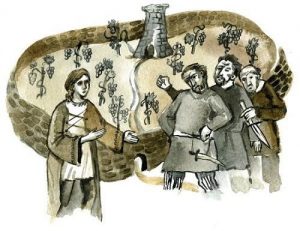 Read: 1 Corinthians 16:13-24; Matthew 21:33-42
Read: 1 Corinthians 16:13-24; Matthew 21:33-42
This Sunday’s Gospel continues the theme of all the Gospels: that our salvation, which is freedom from sin and life in God, is founded on our Lord Jesus Christ. The Letter to the Hebrews begins: “In times past, God spoke in partial and various ways to our ancestors through the prophets; in these last days, he spoke to us through a son, whom he made heir of all things and through whom he created the universe” (Hebrews 1:1-2). God has sent messengers to his vineyard, but they were killed by the vine-dressers, those who had control of the vineyard. Finally they did the same to the Son of God. Jesus, our Lord, was rejected by those in control of his people, the vineyard, who led him to crucifixion. The disciples expected retribution, but Jesus said, “The stone that the builders rejected has become the cornerstone.” St. Paul confirmed this: “you are fellow citizens with the holy ones and members of the household of God, built upon the foundation of the apostles and prophets, with Christ Jesus himself as the capstone” (Ephesisans 2:20).
On the cross, Jesus was abandoned by all, by the leaders of his people, by the mob that chose Barabbas (“The son of the father!”), and even by his own disciples, who betrayed him, denied him, and ran away in fear. Again, St. Paul tells us, “The message of the cross is foolishness to those who are perishing, but to us who are being saved it is the power of God …. For the foolishness of God is wiser than human wisdom, and the weakness of God is stronger than human strength” (1 Corinthians 1:18.25). It is through weakness in worldly power that the true strength of God is manifested, for “by death he trampled upon death.” We must not fear our weakness, but abandon ourselves completely to our Lord, “loving God with all our heart and mind and soul, and our neighbor as ourselves.”
On August 10, we remembered the holy martyr Lawrence. When the pagan emperor demanded he turn over the treasure of the church, he brought him the blind, the lame, and all sorts of sick people, saying, “Here are the eternal treasures of the church.” Jesus also told the parable of the banquet, in which the servants are to bring in “the poor and the crippled, the blind and the lame” (Luke 14:21). Truly, “The stone that the builders rejected has become the cornerstone.”